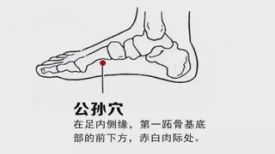Being able to eat is not necessarily a blessing. Eating too much or binge eating can have a cumulative and gradual impact on human health. For the human body, long-term excessive energy intake can easily lead to obesity. According to traditional Chinese medicine theory, "disharmony between qi and blood leads to changes in various diseases." Obese individuals with poor circulation of qi and blood are prone to qi stagnation and blood stasis. Once qi stagnation and blood stasis occur in certain parts of the body, they are more likely to fall ill.
Modern medical research also shows that obesity is a risk factor for many chronic diseases, such as heart disease, diabetes, hypertension, etc. Therefore, a moderate diet and following the principle of "seven parts full" are the key to maintaining physical health.
The dietary principle advocated in "Health Preservation and Life Extension Record" is "not to overeat and not to drink excessively". "Seven percent full" is the embodiment of this principle.
"Seven percent full" means stopping eating when you feel full and can continue to eat a small amount of food, in order to achieve nutritional balance without overeating. This principle also coincides with the promotion of "proper diet" in the Yellow Emperor's Inner Canon.
Can long-term dieting prolong life? Since ancient times, there has been a saying in our country that "eating grains for health preservation" means "not eating five grains" for a period of time to achieve the goal of health preservation. In addition, in recent years, "fasting therapy" has gradually become popular, and many people consider skipping meals as a trendy way of health preservation.
If eating too much may cause a burden on the spleen and stomach, thereby affecting physical health, what are the effects of eating too little or not eating for a long time on the body?
Traditional Chinese medicine believes that moderate dieting helps to regulate the spleen and stomach, promote qi and blood biochemistry, and thus achieve the goal of health preservation. However, long-term excessive dieting may lead to malnutrition in the human body and affect the normal function of body organs.
As the "acquired foundation" of the human body, the health status of the spleen and stomach can directly affect the absorption and transformation of nutrients in the human body; Excessive dieting can cause direct damage to the spleen and stomach, and important organs such as the heart and lungs can also be unable to function properly due to insufficient nutritional supply. Therefore, dieting should not be seen as a shortcut to longevity, and such methods should be used rationally to avoid damaging physical health.
To manage the health of three meals, it is necessary to have a correct understanding of these health wisdom, cultivate healthy eating habits, maintain a reasonable amount of food, consume balanced nutrition, and integrate the correct health concept into every meal.
Timed and Quantitative Eating: According to "Essentials of Drinking and Eating", "time is the most expensive way to eat", emphasizing the importance of timed and quantitative eating. Reasonably arrange three meals, ensure sufficient protein intake for breakfast, and supplement the consumption of overnight sleep; Consume sufficient energy for lunch to support daily life activities; Dinner should not be too full or too greasy. Eating three meals on time, with balanced nutrition, helps maintain the balance of yin and yang in the body.
Chewing and swallowing slowly: The "Four Essentials of Health Preservation" emphasizes "chewing and swallowing slowly to facilitate digestion". Chewing slowly and thoroughly can reduce the burden on the gastrointestinal tract and promote digestion and absorption. In addition, chewing slowly can also slow down the rate of blood sugar rise and prevent the occurrence of high blood sugar.
Standardizing dietary structure: According to "Lao Lao Heng Yan", diet should be tailored to individual needs, and there should be differences in dietary structure for people with different constitutions, age groups, and health conditions. Elderly people have weaker spleen and stomach compared to the general population, so they should choose soft and easily digestible foods; Due to the needs of growth and development, children need to ensure sufficient food intake and nutrient rich food; People with a cold constitution should eat some warm and nourishing foods, such as ginger and lamb, appropriately; For those with a hot and dry constitution, they can choose some cool and refreshing foods, such as mung beans and winter melon.
Does overeating and overeating really reduce lifespan?
Release time:2024-05-28 19:52:20
Reading:219
Word Count:4609
Subscribe to email


